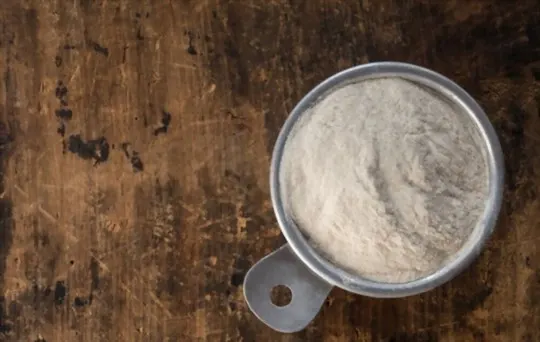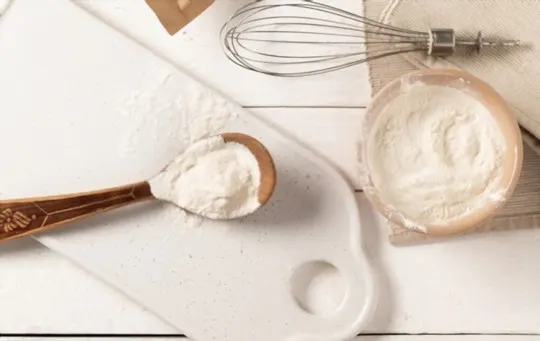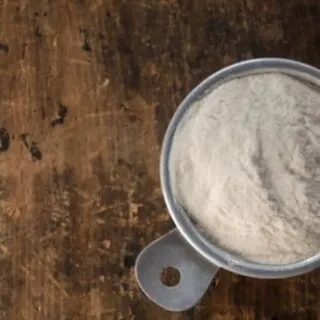Do you use xanthan gum in your recipes? Are you wondering how long it lasts and if it can go bad?
That’s exactly what we’ll explore in this blog post—the shelf life of xanthan gum and some tips to ensure its longevity.
As a food binder, thickening agent, and emulsifier widely used across cuisines around the world, understanding the science behind maintaining xanthan gum is essential for anyone working with ingredients that require stability over an extended period.
Before diving into specific strategies for preserving xanthan gum, let’s take a closer look at what it is and why it’s so widely used in cooking.
What Is Xanthan Gum?

Xanthan gum is a polysaccharide that is produced by bacteria.
It is often used as a food additive or thickening agent.
Xanthan gum has many properties that make it useful in the food industry, including the fact that it is non-toxic and can be used as an emulsifier.
Xanthan gum is also known to have a long shelf life, making it a popular choice for foods that need to be stored for long periods of time.
What Are The Benefits Of Using Xanthan Gum?
Xanthan gum is a popular food additive that is used as a thickener, emulsifier, and stabilizer.
It is made by fermentation of glucose or sucrose by the Xanthomonas campestris bacterium.
Xanthan gum has many benefits, including the following:
- It can help to thicken and emulsify foods.
- It can help to stabilize foods and prevent them from separating.
- It can help to add volume to low-calorie foods.
- It can help to improve the texture of gluten-free baked goods.
- It can act as a prebiotic, promoting the growth of beneficial bacteria in the gut.
Xanthan gum is safe for most people to consume and is generally well tolerated.
However, some people may experience digestive issues after consuming it.
If you are concerned about whether xanthan gum is right for you, talk to your doctor or registered dietitian before adding it to your diet.
How Long Does Xanthan Gum Last?

Xanthan gum is a food additive that has a variety of uses, including as a thickener, emulsifier, and stabilizer.
It’s made from fermented corn sugar and is safe for most people to consume.
However, some people may experience mild gastrointestinal side effects, such as bloating, gas, or diarrhea.
Xanthan gum typically doesn’t expire and has a long shelf life.
However, it may start to lose its potency over time and may not be as effective in recipes.
Once opened, xanthan gum should be stored in an airtight container in a cool, dry place.
How Should You Store It?
Xanthan gum should be stored in a cool, dry place.
It will last longest when stored in an airtight container, but it can also be stored in a resealable bag.
Xanthan gum can start to degrade when exposed to moisture or humidity, so it’s important to keep it away from any sources of moisture.
Conclusion
Xanthan gum is a versatile ingredient that can be used in a variety of recipes.
It has a long shelf life and can last for several years if stored properly.
When stored in a cool, dry place, xanthan gum can last for up to three years.
Keep it in an airtight container to ensure its freshness.
Xanthan gum is a great ingredient to have on hand to add a bit of thickness and creaminess to recipes.

How Long Does Xanthan Gum Last? Does It Go Bad?
Ingredients
- Xanthan gum
- Air-tight containers or Ziplock bags
- Labels and markers
Instructions
- Store your product in an labelled container in a cool, dark place like the pantry or fridge.
- If your food is frozen, allow it to thaw in the fridge before cooking.
- Make sure to look for signs that your food has gone bad before eating it.

Carrie is a food writer and editor with more than 15 years of experience. She has worked for some of the biggest names in the food industry, including Bon Appétit, Food & Wine, and Martha Stewart Living.
As the Editor in Chief of IntroChicago.com, Carrie oversees all of the content on the site. She also manages the team of contributing writers and editors, who help to create delicious recipes, helpful tips, and informative articles that you’ll find on the site.
A native of the Chicago area, Carrie is passionate about all things food. She loves trying new restaurants and experimenting with new recipes in her kitchen. She’s also a graduate of the Culinary Institute of America, so she knows a thing or two about food!
